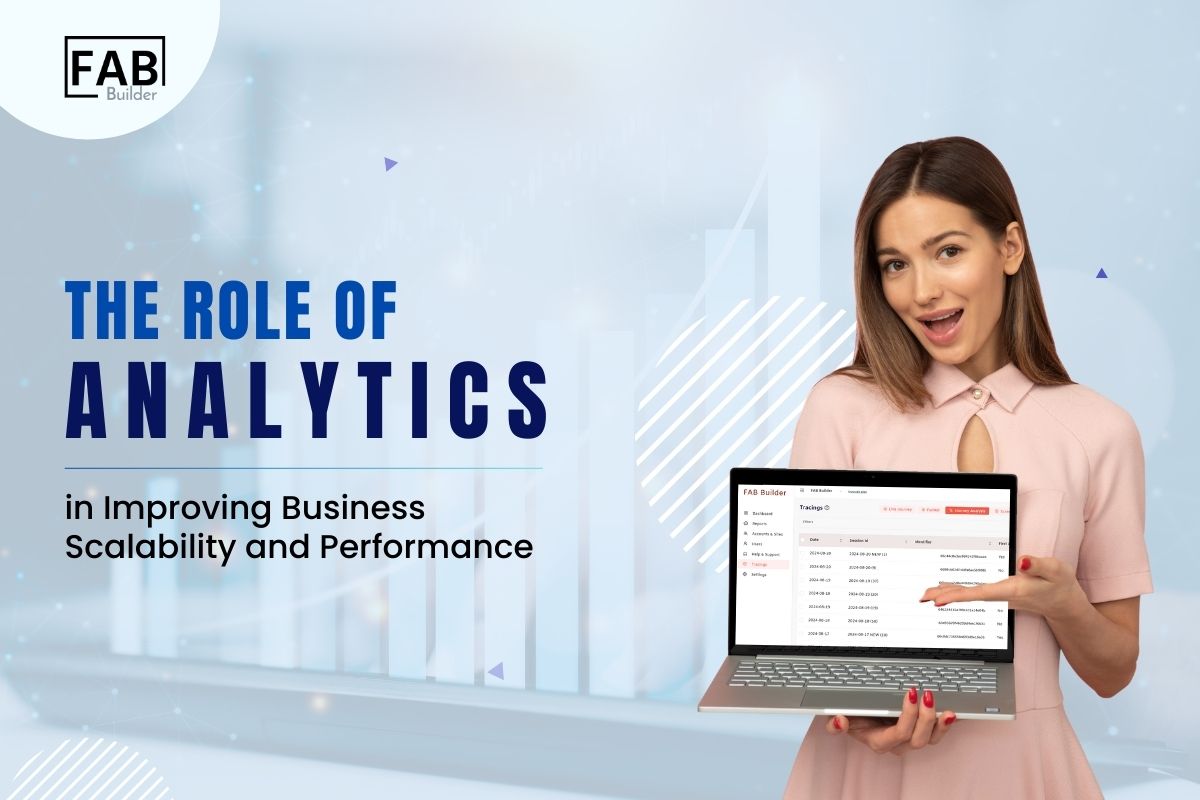Businesses continuously seek methods to increase performance and scalability in today’s data-driven environment to maintain competitiveness and achieve long-term success. Analytics has become a potent instrument, providing priceless insights that influence choices, streamline workflows, and boost productivity. Businesses may ensure they are ready for expansion and simplify processes by utilising data analytics. This article will examine how analytics may enhance performance and business scalability, emphasising the tactics that provide quantifiable results.
Understanding Business Scalability and Performance
Understanding what these phrases represent in contemporary business is crucial before delving into how analytics might affect corporate performance and business scalability.
- Scalability is an organisation’s capacity to expand and meet rising demand without compromising operations or losing cost leadership. Without sacrificing productivity, a scalable company may develop, extend its operations, and handle an influx of new clients.
- Performance, on the other hand, includes how well a business accomplishes its objectives. This covers revenue creation, customer happiness, operational efficiency, and general business growth.
In summary, performance and scalability are both essential for sustained success. Organisations must use data analytics to guarantee they can grow without interruption and continue operating at their best.
The Power of Data Analytics in Modern Business
Data analytics converts unprocessed data into useful insights, giving decision-makers a strong basis. Businesses can see patterns, find inefficiencies, and make wise decisions by analysing historical and current data. Employing cutting-edge analytical methods and instruments, businesses can:
- Optimizing processes will boost operational effectiveness.
- Enhance the customer experience by using tailored communications.
- Choose the correct audience to focus your marketing efforts on.
- Use predictive analytics to forecast future trends and needs.
Thanks to the development of big data and machine learning technology, the potential for data analytics to drive scalability and performance is higher than ever.
How Analytics Drives Business Scalability
1. Automating and Optimizing Operations
One of the main ways analytics increases scalability is by automating and optimizing business processes. Predictive analytics helps businesses anticipate client needs, optimise manufacturing procedures, and guarantee effective resource allocation. By lowering the need for manual intervention and increasing operational efficiency, automation enables organisations to grow proportionately without raising staff or costs.
Supply chain analytics, for example, may assist companies with inventory control, stock shortfall forecasting, and delay avoidance. Similarly, HR analytics may enhance talent management, guaranteeing that businesses have the proper people on staff as they expand.
FAB Builder Analytics provides automated reporting and scheduling tools that help businesses streamline their data analysis process. By delivering insights through various channels like WhatsApp and email, businesses can focus on strategic growth initiatives without the manual burden of data management.
2. Enhancing Decision-Making Through Real-Time Insights
Making decisions gets increasingly tricky as firms expand. Scalability requires the capacity for prompt, well-informed decision-making. With real-time analytics, businesses can monitor key performance indicators (KPIs) and spot problems before they get out of hand. Real-time analytics allows firms to make growth-promoting strategic decisions by supplying current data.
Retail businesses, for instance, may enhance their pricing plans, advertising efforts, and product offers by utilising real-time consumer insights. Their adaptability helps them compete in a constantly changing market and respond to customers’ needs.
With FAB Builder Analytics, businesses can gain real-time insights into their operations, enabling them to adjust their strategies based on live data and trends.
3. Data-Driven Product Development
Extending product lines or breaking into new markets are common steps in scaling a firm. Data analytics offers insightful information on consumer preferences, industry trends, and the advantages and disadvantages of rival businesses. This knowledge is crucial for creating new goods or services that satisfy consumer and market expectations.
By utilising analytics, businesses may test prototypes, improve their process for developing new goods, and introduce items with a better probability of success. This data-driven strategy guarantees that scaling initiatives produce the intended outcomes while lowering risks and speeding time to market.
Using FAB Builder Analytics, businesses can analyze customer feedback and market data to develop products that meet market demands, ensuring a higher chance of success upon launch.
4. Predictive Analytics for Strategic Planning
Predictive analytics is revolutionary for companies trying to grow. By analysing previous data and finding patterns, businesses may foresee future trends, anticipate market changes, and plan for probable obstacles. Thanks to this insight, companies may use proactive scaling methods instead of reactive ones.
Financial analytics, for example, can forecast cash flow patterns, aiding businesses in resource management as they expand. Customer behaviour analytics can also reveal changes in consumer preferences, enabling companies to modify their marketing plans.
5. Cost Management and Efficiency
Cost control is a vital component of business scaling. Growing businesses frequently have to deal with rising operating expenses. Thanks to data analytics, businesses can identify operational inefficiencies and allocate resources more efficiently. This guarantees that the business will grow without incurring exponentially more expenses.
Employing cost analysis tools can help businesses find opportunities to cut waste, optimise operations, or renegotiate contracts. By maintaining strict cost management, businesses may grow sustainably and safeguard their profit margins.
How Analytics Enhances Business Performance
While expansion depends on scalability, long-term success also depends on sustaining excellent performance. This is how analytics is a key component of enhancing business performance.
1. Enhancing the Client Experience
One of the main factors influencing business performance is the customer experience. Analytics enables companies to provide experiences that are specifically customised to each customer’s demands at a time when customers want individualised connections. Through consumer data analysis, businesses can:
- Customise marketing campaigns by making pertinent offers and suggestions.
- Anticipate consumer inclinations and actions to enhance product offers.
- Increase customer happiness by using data-driven insights to improve customer service.
Customer analytics, for example, may help firms discover pain points in the buyer’s journey and optimise their sales funnel to increase customer satisfaction.
FAB Builder Analytics provides insights into customer behavior, helping businesses tailor their services and marketing efforts to improve customer satisfaction and loyalty.
2. Measuring and Enhancing Operational Efficiency
Sustaining strong business performance requires efficient operations. By utilising operational analytics, businesses may evaluate the effectiveness of their processes and pinpoint development opportunities. Supply chain optimization, removing manufacturing bottlenecks, and increasing worker productivity are a few examples.
With the help of operational analytics, businesses may also establish benchmarks and track their development over time. Because of this process of continual development, businesses may continue to operate at a high level even as they grow.
FAB Builder Analytics allows businesses to set benchmarks and track their performance over time, ensuring continuous improvement in operational efficiency.
3. Data-Driven Marketing Strategies
The secret to boosting business performance is effective marketing. Marketing analytics provide insightful information about campaign performance, ROI, and consumer behaviour. Through the examination of data from various channels, companies can:
- Improve the way they target.
- Find campaigns that are doing well.
- Distribute resources more skillfully.
- Optimise the ROI or return on investment.
Businesses can use data-driven marketing to ensure their marketing initiatives align with their growth goals. This improves performance and increases revenue creation.
FAB Builder Analytics offers tools to analyze marketing efforts across multiple channels, ensuring that businesses can allocate resources effectively and maximize their return on investment.
4. Performance Monitoring and KPIs
Keeping an eye on key performance indicators (KPIs) is essential to enhancing business performance. Businesses may measure KPIs in real time with analytics tools to give them a clear picture of how their firm is doing. These insights help firms set reasonable goals, make wise decisions, and remain on course to meet their goals.
Businesses can ensure that they stay aligned with their long-term objectives by employing performance analytics to track staff productivity, sales growth, and customer retention.
With FAB Builder Analytics, businesses can easily track key metrics related to sales growth, customer retention, and operational efficiency, ensuring they stay aligned with their long-term objectives.
5. Enhancing Financial Performance
Most organisations want to improve their financial performance as their main objective. Businesses may use financial analytics to acquire a complete picture of their financial situation and to inform data-driven choices regarding investments, forecasts, and budgeting. By examining historical financial data, businesses may find patterns, evaluate risks, and make strategic decisions that increase their bottom line.
Businesses might, for example, modify their expenditure by using cash flow analytics to identify high and low cash flow times. Analogously, profitability analytics may determine which goods or services provide the most profits, enabling businesses to concentrate their resources on high-margin sectors.
Key Technologies Driving Analytics
Thanks to some technologies, data analytics is becoming more powerful and available to companies of all sizes. Among them are:
- Artificial Intelligence (AI) and Machine Learning (ML): Businesses may use artificial intelligence (AI) and machine learning (ML) to automate data analysis, find hidden trends, and improve forecast accuracy.
- Big Data: Businesses may learn more about their operations and consumer behaviour by processing and analysing vast amounts of data.
- Cloud Computing: Cloud-based analytics solutions’ scalability allows businesses to handle enormous volumes of data in real-time.
Businesses may increase scalability and performance by utilising these technologies to utilise data analytics fully.
Conclusion
Firms must prioritise performance and scalability to succeed over the long term in a highly competitive environment. The instruments required to streamline processes, enhance client interactions, and make data-driven decisions that foster expansion are made possible by data analytics. It is impossible to overestimate the contribution of analytics to increased company performance and business scalability, from real-time insights to predictive analytics. Businesses that make analytics investments are better positioned to expand sustainably, scale effectively, and retain high performance.
Unlock the Power of Analytics Today! Contact us to learn how FAB Builder Analytics can help you drive business performance and scalability.
Frequently Asked Questions
1. How can data analytics help my business grow?
Data analytics helps businesses grow by optimizing operations, automating processes, and providing real-time insights that guide decision-making. It helps predict future trends and improve efficiency, allowing businesses to scale without increasing costs.
2. What is the difference between scalability and performance?
Scalability refers to a business’s ability to grow and handle increased demand without losing efficiency. Performance measures how well a business meets its goals, such as revenue generation and customer satisfaction.
3. How can analytics improve customer experience?
By analyzing customer data, businesses can personalize services, predict needs, and enhance the overall experience. Analytics helps identify pain points and optimize the customer journey, leading to higher satisfaction and loyalty.
4. How does FAB Builder Analytics help my business?
FAB Builder Analytics provides real-time insights into your business performance, including customer behavior and operational efficiency. It helps businesses make data-driven decisions, improving both scalability and overall performance.

